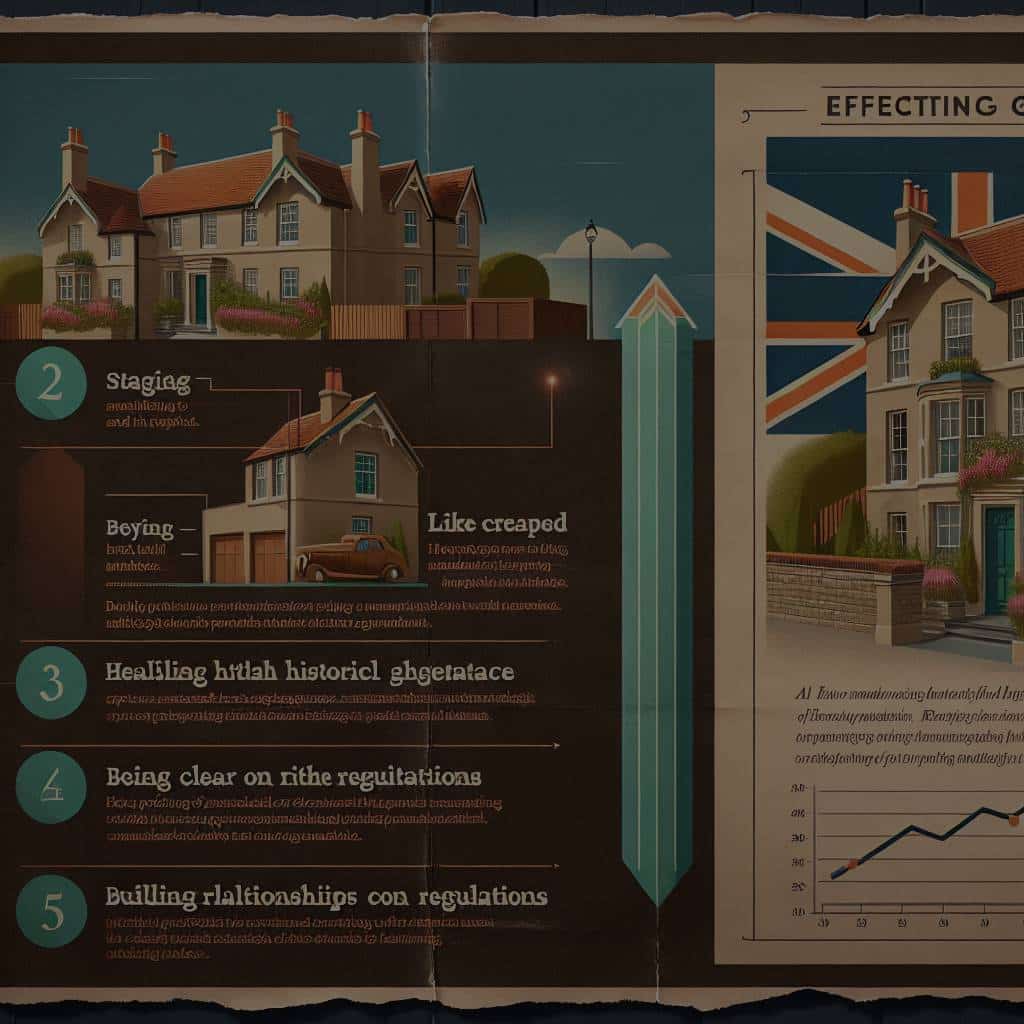How to Effectively Market Heritage Properties in the UK Real Estate Market?

Heritage properties hold a special place in the UK real estate market. These properties, whether they are stately country houses, quaint cottages, or historic commercial buildings, are cherished for their unique architectural designs and the cultural heritage they represent. However, marketing these listed properties can be quite challenging due to their specific conservation needs and complex legal bindings. Here is a comprehensive guide that will assist you, the sellers, in navigating this high-stakes, yet potentially lucrative market.
Understanding the Unique Aspects of Heritage Properties
Before you embark on the process of marketing your heritage property, it is essential to comprehend its unique attributes. These properties are not just old buildings, but they carry a rich history and architectural significance. Unlike regular properties, selling a listed property involves adhering to strict conservation regulations and often requires a more specialized marketing approach.
This might interest you : What Strategies Can Help UK Homebuyers Obtain the Best Mortgage Rates?
Heritage properties, often called listed buildings, are subject to local conservation laws aimed at preserving their historic or architectural significance. These laws may limit the changes that can be made to the property, including modifications, extensions, or demolitions. This may slightly limit the pool of potential buyers, as not all are willing or able to comply with these restrictions.
A listed property’s value is not solely determined by the usual factors like size, location, or housing market trends, but also by its historic significance, architectural uniqueness, and conservation status. Understanding these unique aspects of your heritage property will enable you to create a more effective marketing strategy.
Also to read : How Can Real Estate Investors Profit from the Growing Popularity of Remote Rural Retreats?
Identifying the Right Target Market
Just as important as understanding your property, is identifying who your potential buyers are. Not every buyer in the UK real estate market is looking for a heritage property. The right buyer for a listed building is typically someone who appreciates the historic value and the architectural grandeur of such properties and is willing to take on the associated responsibilities.
Traditional families, history enthusiasts, or commercial investors interested in unique properties for businesses such as boutique hotels or restaurants, are usually more attracted towards heritage properties. By identifying these specific groups, you can tailor your marketing approaches to appeal to them more accurately.
Local community groups or conservation organizations may also show interest in purchasing heritage properties to safeguard them from inappropriate modifications. It’s worth reaching out to such organizations as part of your marketing strategy.
Emphasising the Unique Selling Points (USPs)
Heritage properties invariably come with an array of Unique Selling Points (USPs). Besides their architectural and historic significance, these might include extensive grounds, period features, unique design elements, or even a fascinating past associated with famous personalities or historic events.
Marketing a heritage property effectively means accentuating these USPs in your promotional materials. Make sure to highlight these features and their significance in property descriptions, photographs, and viewings. These unique elements will help distinguish your property from the sea of modern homes and commercial properties on the market.
Potential buyers of heritage properties will be interested in more than just the building’s features; they will also want to know its story. Providing information about the property’s history and its previous inhabitants can add to the building’s allure.
Leveraging the Power of Digital Marketing
In today’s digital age, the internet can be an incredibly powerful tool for marketing properties. Traditional methods like print advertising or open houses are still effective, but online marketing opens up a whole new level of reach and engagement.
For heritage properties, having a strong online presence is a great way to reach potential buyers both locally and internationally. High-quality photographs and virtual tours allow buyers to appreciate the unique features of your heritage property without having to visit in person.
Social media can also be an effective marketing tool. Platforms like Instagram or Facebook are perfect for sharing engaging content such as stunning photos of your property, interesting historical facts, or updates on the sale process.
Engaging Expert Help
Marketing and selling a heritage property is not an easy task. It requires a deep understanding of the property’s unique features, the heritage market, and the complexities that come with listed building regulations. Therefore, engaging help from estate agents who specialize in heritage properties can be highly beneficial.
These agents will have extensive knowledge of the heritage property market, including the potential buyers, legal requirements, and the best marketing strategies. They will also have the necessary connections within the industry, which can be invaluable in effectively marketing your property.
Remember, selling a heritage property is not just a commercial transaction, but it’s about finding the right custodian who appreciates and preserves the historical, architectural, and cultural value of the property. By understanding the unique features of your property, identifying the right target market, highlighting the USPs, leveraging digital marketing, and engaging expert help, you can navigate the complex heritage property market and achieve a profitable sale.
Staying Updated with Real Estate Market Trends
To effectively market heritage properties, it is crucial to stay updated with the latest trends in the real estate market. Market trends give you an understanding of the buyer’s behaviour and preferences, which can be used to tailor your marketing strategy and make your property stand out. Consider factors such as house prices, search patterns on property portals and seasonal variations, like peaks in the market in December, November, and October.
Additionally, specific trends related to heritage properties should also be carefully observed. Reports and data from sources like Historic England and Knight Frank can provide valuable insights into the heritage property market. They can help you understand the demand for listed buildings, the average pricing, and the preferred locations for potential buyers.
Moreover, staying informed about changes in local conservation laws and regulations for listed buildings is particularly essential. These can heavily influence a heritage property’s value and the modifications that can be made to it, thus affecting its overall appeal to potential buyers.
Remember, the more informed you are about the real estate market trends and specific nuances of the heritage property market, the better positioned you are to market and sell your property effectively.
Collaborating with the Local Community
Collaborating with the local community can be a significant aspect of marketing heritage properties. The local residents usually have a deep sense of attachment and pride towards the historic properties in their area. They can provide a wealth of information about the property’s history, cultural significance, and its role in the community.
In some cases, local communities or heritage groups may be interested in buying the property to preserve it. It’s worth exploring partnerships with these groups, as they could turn into potential buyers or aid in promoting the property. Engaging with local heritage societies, museums, or culture heritage groups can help create a buzz around your property and attract the right kind of attention.
Additionally, getting the local community involved can bring to light interesting stories or facts about the property, which can be used in your marketing materials to add to the property’s charm and unique selling points.
In conclusion, selling a heritage property in the UK real estate market involves more than just putting up a ‘for sale’ sign. It requires a deep understanding of the property’s unique attributes, market trends, effective use of digital marketing, collaboration with local communities, and most importantly, the help of estate agents experienced in dealing with such properties. By following these strategies, you can navigate the complexities of the heritage property market and ensure a successful, profitable sale. Remember, every heritage property has a story, and the key to effective marketing is to tell that story compellingly and attractively to the right audience.
